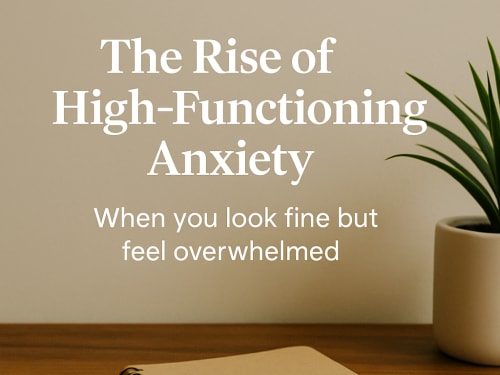🧠 The Rise of High-Functioning Anxiety: When You Look Fine but Feel Overwhelmed

posted 27th October 2025

🧠 The Rise of High-Functioning Anxiety: When You Look Fine but Feel Overwhelmed
You wake up, get dressed, tick off your to-do list, and smile at everyone you pass. From the outside, it looks like you’ve got it all together. But inside, your mind is racing, thoughts spiralling, heart pounding, and a constant feeling that you’re not doing enough.
Welcome to high-functioning anxiety — a hidden struggle often masked by success, productivity, and perfectionism. Though it’s not a formal diagnosis in the DSM-5, it’s a very real experience for millions who appear calm and capable yet constantly battle inner tension.
💭 What Is High-Functioning Anxiety?
High-functioning anxiety describes people who experience symptoms of anxiety — such as overthinking, restlessness, and excessive worry — yet continue to “perform” well in daily life.
These individuals often excel in their careers, studies, or personal goals, but their drive stems from fear of failure rather than calm motivation. Psychologists link it to traits like:
- Perfectionism and people-pleasing.
- Overachievement as a way to control anxiety.
- Chronic self-criticism and difficulty relaxing.
It’s the anxious mind in overdrive — productive, but perpetually exhausted.
📈 Why It’s Becoming More Common
Research shows anxiety levels have been steadily rising, particularly among young adults.
- In the UK, 1 in 3 adults report experiencing anxiety that significantly affects daily life (Mental Health Foundation, 2023).
- Social media and “hustle culture” amplify pressure to perform and compare.
- Modern society often rewards anxious traits, busyness, overthinking, and relentless productivity.
In today’s world, looking “put together” can be the perfect disguise for chronic stress.
⚠️ Signs You Might Have High-Functioning Anxiety
- You appear calm, but you often feel tense or restless inside.
- You can’t switch off — even when things are going well.
- You overthink conversations or worry about being judged.
- You stay busy to avoid feeling anxious.
- You struggle to rest, relax, or say “no.”
If this sounds familiar — you’re not alone.


🧩 What Helps — Backed by Psychology
You can’t “switch off” anxiety overnight, but the right strategies can help you manage it more effectively:
1️⃣ Practice Self-Compassion
Instead of asking, “What’s wrong with me?”, try “What do I need right now?”
Research by Dr. Kristin Neff shows that self-compassion significantly reduces anxiety and burnout — far more effectively than self-criticism (Neff, 2011).
2️⃣ Mindfulness and Grounding Techniques
Breathing exercises, mindful walks, or short meditations help calm the nervous system and reduce racing thoughts. Studies show mindfulness-based interventions improve emotional regulation and lower anxiety symptoms (Hofmann et al., 2010).
3️⃣ Challenge Perfectionism
Ask yourself: “Is this genuinely important, or just my anxiety talking?”
CBT techniques can help reframe unrealistic expectations and ease performance-related stress (Egan et al., 2014).
4️⃣ Prioritise Rest — It’s Productive
Your worth isn’t measured by your output. Schedule rest like an appointment — essential, not optional. Consistent rest improves focus, creativity, and resilience (Alkozei et al., 2018).
🧾 References
Alkozei, A., Smith, R., Killgore, W. D. S. (2018). The importance of sleep for emotional regulation and mental health. Nature and Science of Sleep, 10, 249–259.
Egan, S. J., Wade, T. D., & Shafran, R. (2014). Perfectionism as a transdiagnostic process: A clinical review. Clinical Psychology Review, 34(3), 181–198.
Hofmann, S. G., Sawyer, A. T., Witt, A. A., & Oh, D. (2010). The effect of mindfulness-based therapy on anxiety and depression: A meta-analytic review. Journal of Consulting and Clinical Psychology, 78(2), 169–183.
Mental Health Foundation. (2023). Anxiety: The most common mental health problem in the UK. London: MHF.
Neff, K. D. (2011). Self-compassion: The proven power of being kind to yourself. HarperCollins.




